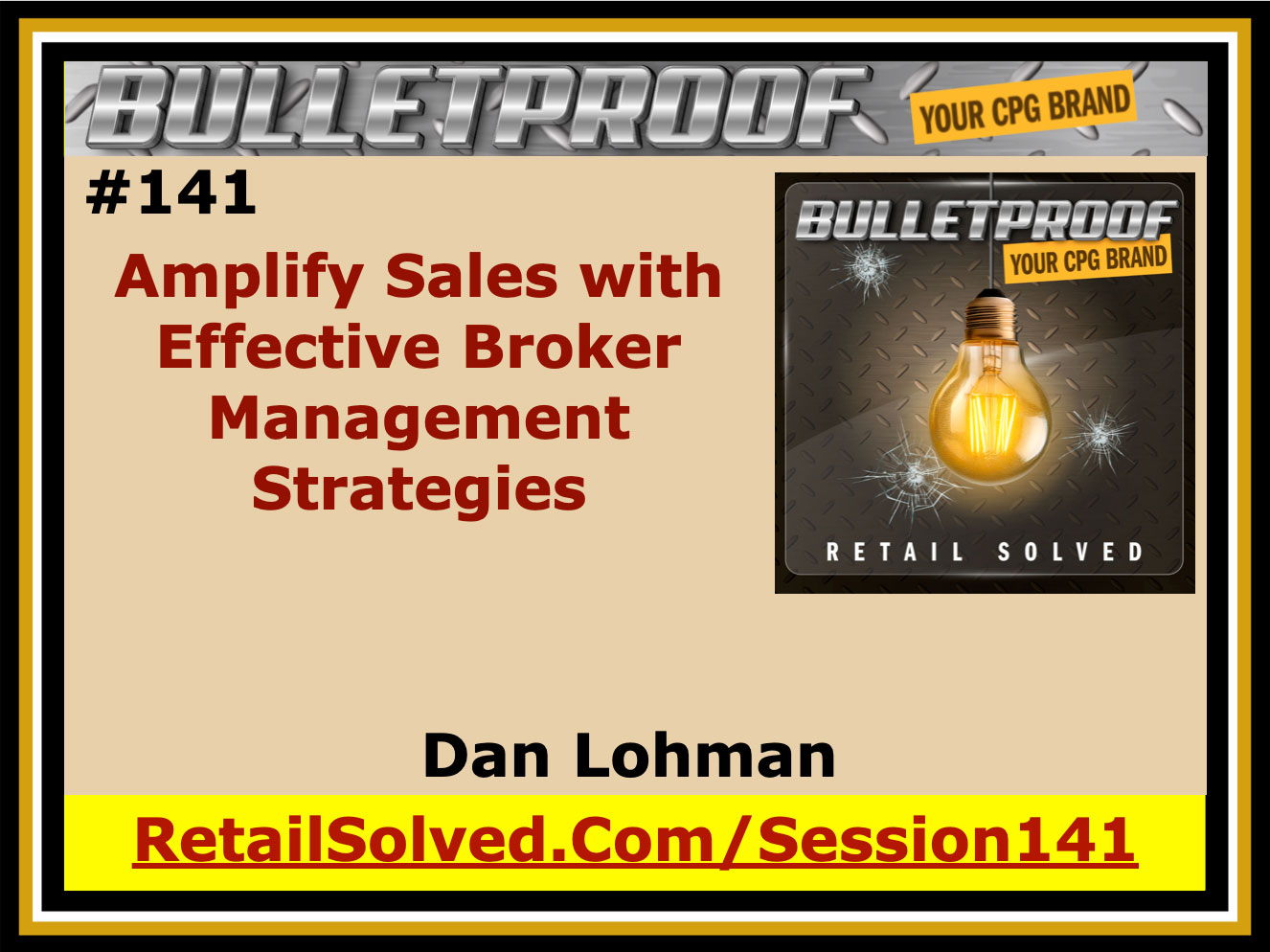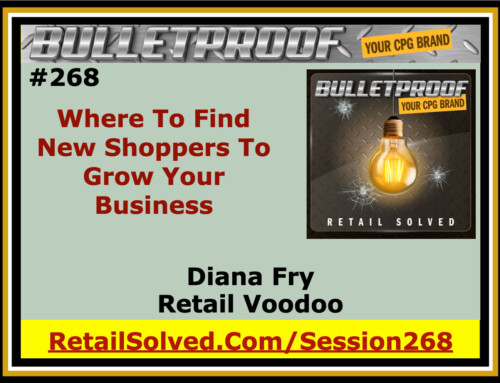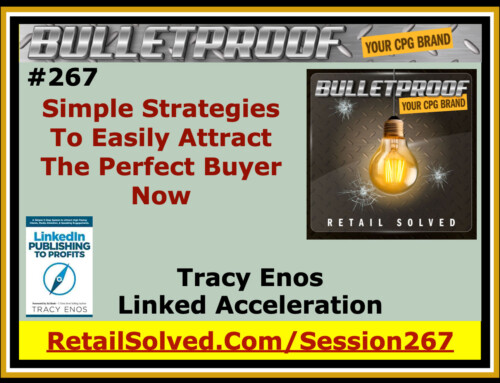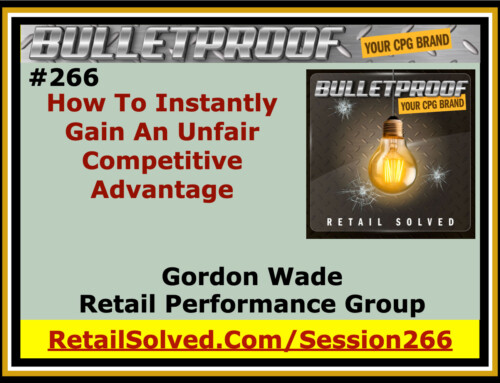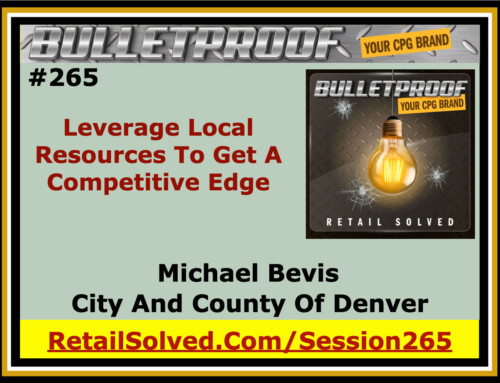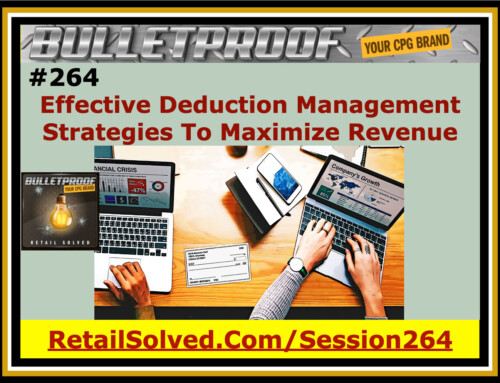Unlock strategies to amplify sales with broker management and enhance your brand's performance in the market. Never hand the keys to your business to anyone. Brokers, as external sales forces, can be cost-effective but require clear communication, support, and accountability. Not providing that could be detrimental to your brand and can blunt and even derail your growth potential.
Most brands rely on brokers to sell and merchandise their products. Hiring your own team is a luxury few can afford. I get a lot of questions about strategies to grow sustainable sales by leveraging their broker relationship. Insider secrets inside!
Welcome. I've been getting a lot of questions from a lot of brands of all sizes, including mainstream brands, about how to more effectively manage your broker, so I decided that I'd make this the focus of this episode. Let me start where it all began. A little over seven years ago, I wrote one of my first articles for New Hope about how to manage your broker more effectively. That article quickly became one of my most downloaded and clicked on articles ever. It became so popular that it landed me several speaking gigs, including at the Natural Products Expo and at various other events as well as in many industry trade publications. Today, it is still one of the most requested topics that I write about and speak about on my podcast. In fact, in the last couple months, I've received several requests from companies of all different sizes to fly in and train and work with their team on this specific topic. Thank you to those brands who invited me to be a part of their national sales meetings. So I wanted to take this opportunity to share with you some of the insider secrets that I share with them.
Now, I will share that I do have a lot of content around this, so go to my website and check it out if you need more resources or if you have additional questions that I don't answer here. I have far more content on this than I can begin to share on this single podcast episode including several podcast episodes. Some of my guests have shared that broker relations are their chief bottleneck – including Madeline Haydon of Nutpods in episode 89. What do you think of this podcast episode? Drop me a note and let's chat. I'd love to answer your specific questions. So, reach out to me and let me know how I can help you explode sales with an external sales team like a broker.
Download the show notes below
Listen where you get your podcast
Important: Brand Secrets and Strategies has been rebranded to Retail Solved. Please swap all BrandSecretsandStrategies.com URL’s with RetailSolved.com. This is now the Bulletproof Your Brand podcast. Thank you for listening! BRAND SECRETS AND STRATEGIES PODCAST #141 Hello and thank you for joining us today. This is the Brand Secrets and Strategies Podcast #141 Welcome to the Brand Secrets and Strategies podcast where the focus is on empowering brands and raising the bar. I’m your host Dan Lohman. This weekly show is dedicated to getting your brand on the shelf and keeping it there. Get ready to learn actionable insights and strategic solutions to grow your brand and save you valuable time and money. LETS ROLL UP OUR SLEEVES AND GET STARTED! Welcome. I've been getting a lot of questions from a lot of brands of all sizes, including mainstream brands, about how to more effectively manage your broker, so I decided that I'd make this the focus of this episode. Let me start where it all began. A little over seven years ago, I wrote one of my first articles for New Hope about how to manage your broker more effectively. That article quickly became one of my most downloaded and clicked on articles ever. It became so popular that it landed me several speaking gigs, including at the Natural Products Expo and at various other events as well as in many industry trade publications. Today, it is still one of the most requested topics that I write about and speak about on my podcast. In fact, in the last couple months, I've received several requests from companies of all different sizes to fly in and train and work with their team on this specific topic. Thank you to those brands who invited me to be a part of their national sales meetings. So I wanted to take this opportunity to share with you some of the insider secrets that I share with them. Now, I will share that I do have a lot of content around this, so go to my website and check it out if you need more resources or if you have additional questions that I don't answer here. I have far more content on this than I can begin to share on this single podcast episode including several podcast episodes. Some of my guests have shared that broker relations are their chief bottleneck - including Madeline Haydon of Nutpods in episode 89. . What do you think of this podcast episode? Drop me a note and let's chat. I'd love to answer your specific questions. So, reach out to me and let me know how I can help you explode sales with an external sales team like a broker. Before I go any further, I want to remind you that there's a free downloadable guide for you at the end of every podcast episode. I always include one easy-to-download, quick-to-digest strategy that you can instantly adopt and make your own, one that you can use to grow sustainable sales and compete more effectively. Remember, the goal here is to get your product or more store shelves and into the hands of more shoppers, empowering brands, and raising the bar. And more importantly, the subject of this podcast is, how do you leverage your broker partner to help you grow sales and help you get your product on more shelves? As always, I really appreciate you for listening. If you like the podcast, share with a friend, subscribe, and leave a review. Maximizing broker effectiveness. Nothing happens until someone buys your product. Getting your brand on more store shelves and into the hands of more shoppers is critical to your success. This requires a dedicated sales team all working in unison. This includes both your internal and your external sales teams. The status quo is that retailers have all the power, and I want to challenge that premise. What I mean by that is that retailers need brands as much as brands need retailers. This needs to be a partnership. You're in this together. Think of the retailer's journey in this same way that you think of the brand's journey. How do you help each other grow, and how do you help each other achieve their objectives? Let me explain. The customer journey's changed. Shoppers have literally unlimited choices as to where they spend their hard-earned money. The way this game is played, the retail game, is that you work to keep customers from going to your competition, from inviting them to go to your competition. When I say inviting them to go to your competition, what I mean is don't risk disappointing your customers. Give them every reason to come back into your store and not shop your competition. With the competitive landscape the way it is and with all the choices that customers have today, retailers effectively trade sales with their competition. This is where you come in, and this is why you're such a valuable asset to your retailer. Help your retail partner improve the shopper journey. Make it easy for customers to find the products that they want. You try to keep the customers coming back into store repeatedly. And the best way to do that is the leverage of the relationship that your customers have with the brands that you sell. So to do that, you've got to have strategies in place that makes sure that you've got the right product on the shelf, that you don't have out-of-stocks, and that you know exactly who your core customer is. And we'll get to that in a minute. The point is this, retailers and brands need each other. Savvy retailers need brands willing and able to help them grow sales. This is how a brand becomes more than just another package on a shelf. There are a couple of concepts that I want to share with you before I go any further. First of all, the two things that you really need to be thinking about are share of wallet and market basket. So let me explain. Share of wallet, when your customers make a list of all the things that they need to buy, how much money is it going to cost him? And then more importantly, how do you get them to buy all the things that they need on their list in your store so that you don't invite them to go shop your competition? And two, market basket. Market basket is the sum total of everything the shopper buys as they check out of a store. Now, the reason this is important is because natural, healthy organic brands have higher, shopper market baskets than a lot of the other brands that they compete with. The reason for that is that the natural consumer wants products that are of a higher quality. Let me explain. The shopper that buys organic produce is probably going to buy organic spread, organic dairy, organic everything around the store, so their market basket's going to be a lot higher. And as a result of that customer, your customer, is going to be more valuable to the retailer. Being able to leverage this in your selling story is critically important to your success. When you decide to get your product into retail, one of the first things that you need to hear is that you've got to pay for slotting. You got to pay for distribution. You've got to pay for menu fees, and promotions, et cetera. That stuff costs a lot of money. The reality is this, the value of the customer that you drive into the store is more important. It's more valuable to the retailer than the ingredients in your package. So how do I know this? I used to be a retailer. I used to be a grocery manager. And I remember the thing that I was tasked with was trying to drive profit in the store, trying to earn a reasonable profit in the category, and having a competitive vantage in my market. These are the things that matter most to retailers. Any brand willing and able to help their retail partner accomplish these three important goals is going to become a valued, and respected, and trusted resource. This is why I'm a firm believer that brands need to own every aspect. They're the selling story. Your brand has your name on it. Everything that happens to the brand, whether it's an out-of-stock, or poor merchandising, or anything else is a poor reflection on you, the brand, and it can embarrass your retail partner. For that reason, you should never hand the keys of your brand to anyone, literally anyone. That's the focus of this content, teaching you how to leverage and how do you manage your brokers and your agencies more effectively to help drive sales so that your brand is being represented the way you want it to. Now, this all begins with your selling story and making sure you have a consistent brand message. Have you ever played the game where you share a story with someone, and they share it with someone else, and then so on? By the time the story comes back around to you, the story's unrecognizable. This is why I developed the free Turnkey Sales Story Strategies course. This is the Achilles heel of most brands. Let me explain. Most salespeople share the story, their brand story, in their own voice, which means that they frequently overlook or ignore important details that are important to the brand, things that the brand needs to be communicating to the retailer, to their consumers. Your story needs to be told the same authenticity, passion, and enthusiasm as originally told by the founder across every aspect of your sales funnel. This one thing, if you could do this, this one strategy, will set you apart from your competition. This single strategy will help grow your brand faster than anything else you're going to hear from me or any other consultant, broker, distributor, agent, you name it. This is the foundation that you need to build your brand on. As a side note, I came upon this strategy early in my career, and I've been able to leverage it to push around some of the biggest, most iconic brands on the planet. This single strategy's been a game-changer. It's worked for me, it's worked for my clients, and it can work for you if you adopt it and make your own. Now, the second part of this strategy is that you never want to farm out your brand strategy. You want to make your brand strategy top priority. I believe that one of the best ways to do that is to develop and manage your brand strategy from the top. In other words, everyone on your sales team, both your internal and your external sales team, is in lockstep, executing your brand strategy the way you designed it so that everyone is telling your story with the same authenticity, passion, and excitement as the founder. The reason this becomes so important is because brokers and agencies, in order to be effective, a lot of times use cookie-cutter strategies. In other words, the strategy that they apply to you is the same strategy, or a very similar strategy, to what they use for other brands that they represent. Now, this is not meant to be a knock-on brokers. Just like in any field, there are good and bad brokers, doctors, agencies, distributors, lawyers, consultants, etc. We’re going to assume that your broker has a track record and reputation for quality brand representation. Brokers can be a tremendous asset, but the simple reality is this. No one, absolutely no one's going to put forth the same effort and the same enthusiasm as you, the brand. For this reason, you need to leverage a strategy and then bring your broker onboard, educate them about your brand, help get them excited about your brand. Your creativity is your single biggest asset. Think about the product you've created. You've put your love, your heart, your soul, everything you've got into creating a product that's amazing, that's going to disrupt the world. Shouldn't your go-to-market strategy be every bit as creative as your brand is? Think about it. This is why I'm such a strong, firm believer that the brand needs to manage all the strategy and that you need to leverage your broker partner for execution and for the introductions into various stores. So let's talk about what it means to work with a broker and distributor. First, what is the difference between an internal sales force and an external sales force? An internal sales force is when the brand employs all the merchandisers, everyone who calls around all the different stores, everyone who works with the same objective gets your product on more store shelves and into the hands of more shoppers. Now, this is horribly expensive, and this is why a lot of brands go to an external sales force. Now, one of the benefits, before we go there, is that having an internal sales force, everyone is paid by the brand. Everyone gets the same training as the brand. So in other words, you're in lockstep. You have the same mindset, the same frame of mind as you work to build your brand. Now, a broker is an external sales force. What that means is you're leveraging a broker to fill in for those places where you can't afford to hire your own sales team. In other words, hiring a broker to put sales teams and merchandisers in locations that you can't afford to do it yourself, can be very efficient and can save you a ton of money. This is largely because that same sales team that works for the broker is calling on a lot of other brands at the same time. That's one of the biggest efficiencies of having a broker partner with you or work with you. So what role should a broker and distributor play? In my opinion, the best role for them is to have them execute your brand strategy. In other words, in addition to making introductions to retailers, one of the best parts about working with a broker is that you can have a broker execute on your behalf, making sure that the product gets distribution in various retailers, making sure that your product's properly merchandise. This, of course, requires that you work closely with them. We'll get to that in a minute. So how do you maximize your relationship with them, and who should be responsible for what? Well, this is where things get a little bit tricky. This is where you start hearing the horror stories about brokers. The reason for that is a lot of times brands have unrealistic expectations of what the broker can or can't do. And because of the lack of communication, there's a love-hate relationship. I see this all the time, and that's why we're talking about this today. I want to help you avoid that. I want to help you have the kind of relationship with your broker where you can leverage them to maximize your sales. One of the first things that you need to do is not have unrealistic expectations. You need to understand what their capabilities are. Do they have expertise in your specific category? And if so, what does that look like? What is their track record? How can they help you achieve the objectives that you have? Communication here is extremely important. Assume nothing. Here’s why this matters. Let’s say you have a frozen product but your broker has no experience in that department. You cannot then expect them to be an expert in everything regarding shipping, merchandising, inventory control, promotions, shelf placement for frozen products. As a former grocery manager, I promise you that this is more involved that managing shelf stable products with a long shelf life. Next, you need to be able to support your brokers and distributors with retail-ready presentations. Remember I said I believe that all the strategy needs to remain at the brand level? This is why this is so important. I believe that the best strategy is to be able to give your broker a presentation, a retail-ready presentation, with everything that they need in it to succeed. Remember, you're the expert in your brand. Don't expect the broker to put things in there that they're not familiar with. In other words, make sure that when you tell the story, the story in your presentation, to the retailer through the broker, that it has everything in it that's going to help that broker succeed. Next, you want to provide them with calendars. What does that promotion schedule look like? When you've got a new item presentation, give them merchandising recommendations. Make sure that you cover every single thing that needs to be covered as if you were working with a retailer yourself. Next, you want to help brokers six-seater on your behalf. Remember, their success is your success. One of the best ways to do that is you use a scorecard. A scorecard is one of the best project management tools, and I recommend you use it for everything. A scorecard accurately communicates your goals, your expectations, and your objectives. It breaks the project down into bite-sized chunks, and it identifies who's responsible for what. Then, when are they responsible? When do they have to achieve that objective by, each particular objective? In other words, if you've got a promotion and a store next month, when do you need to order the product to make sure that it's in stock and make sure that it's ready for the promotion? In addition, how much extra product do you need to make sure that each store has so that they avoid out-of-stocks? These are things that you need to help guide the broker with so that you can ensure that you maximize each and every selling opportunity so that the retailer's going to be impressed. The goal here is to have the retailer look to you because they know, like, and trust and they believe, they absolutely know, that you're going to be the one brand that they can count on to deliver exceptional value. And exceptional value means making sure that the displays get put up the way they need to and taken down when they're supposed to, making sure that there are no out-of-stocks, and making sure that the retailer's not left with a lot of extra product after the promotion ends. When you're using a scorecard, one of the important things is that you make sure you get buy-in from all parties, everyone that's responsible for something. Make sure that you communicate clearly what the expectations are. Then, hold them accountable. The next thing you want to do is you want to be able to know who your retail partner is. No two retailers are alike. Never forget that. You needed to become an expert in the retailer. For example, what are their strategies? What are the rules for different categories, et cetera? What is the retailer's persona? What do they want to be known for in their market? What's important to them? And then how do you help them achieve their objective? Always put the retailer first, always. Never assume anything, and never apply a cookie-cutter approach. Always question. How can you improve the shopper journey? How can you make it easier for their customers to come into the store and get everything on their list? Remember, the goal is to not invite their customers to shop somewhere else by disappointing them or not giving them what they want. Focus on the long-term relationship. Become a value-added resource and stay ahead of key trends. This is one of the reasons why I advocate you going on key retailer calls with your broker. In other words, partner with your broker and attend the important meetings with them so that you can help guide them so that you can help ensure that your brand is being represented the best possible light. Next, how well do you know your retailer? I've seen a lot of brands leave this in the hand of the broker. But what if you change brokers? What if the person that calls on that particular retailer leaves that broker? I believe that brands need to have their own relationship with the retailer. For that reason, I believe you need to get to know them. Who are the people that work with your brand? What are their key roles? What are their responsibilities? Make an effort to get to know your retail partner. My big successes and the successes of my clients have come from having a genuine friendship with the retailers that they support. Remember, this needs to be a symbiotic relationship. If you can help them, then savvy retailers will frequently help you, help you achieve your objective, and even sometimes giving you incremental displays, et cetera, that they don't always charge other brands for. This is another strategy that I'll talk about in other courses and other podcast episodes. Next, let's talk about merchandising. Merchandising is the art and the science of getting your product into the hands of the shoppers. For merchandising to be effective, your products have to be available where your customers shop. Now, the strategy that most brands use today is they simply take their product and they give it to the retailer and they hope and pray that their retailer puts it someplace where the customers will find it. In podcast episode 104, I share a real-life story from a fan who called me and told me about a problem that they were having in a store. They went to the store that their friend had just gained distribution in wanting to support them. But the problem is they couldn't find the product where it was supposed to be. Now, the challenge is the agency that got them distribution did not help guide the retailer as to where they needed to put it on their shelf. As a result, with the help of the store personnel, the person spent 20 minutes with the store staff trying to find the product. This missed opportunity cost the brand a lot. They spent a lot of money to drive traffic to the store for people to try out their new product. That was wasted. The retailer was looking forward to all the new traffic coming to their store. Unfortunately, they missed out, too. And in addition, now the brand needs to schedule an appointment to meet with the retailer to try to get their product merchandise where it should have been merchandised in the beginning. Problems like this can derail or even bankrupt a brand. This is why we're having this conversation today, and this is why I'm such a staunch proponent for brands owning the strategy and leveraging their relationship with agencies, brokers, distributors, et cetera, to execute that strategy on their behalf. The next thing you want to know is, how does your customer shop the category? Do they look for your product at eye level? If so, then recommend to the retailer that your product be merchandised at eye level. Then, give them a fact-based reason so that they understand why that matters so that they can maximize the sales of your product and the customer that buys your product. When you're working with the retailer, be an expert in their stores, know what's important to them, know who their ideal shopper is, and know who their competitors are, and know what their competitor strategies are as well. This is how you become a value-added resource to the retailer. Knowing this and being able to help the retailer with their strategies makes things turnkey for them. It makes it easier for them to say yes to any new item introduction, any merchandising recommendations you have. One of the things that I spend a lot of time talking about is creative merchandising strategies. This is where you want to make sure that your broker understands exactly what's expected of them and understands exactly what your strategy is. For example, if you're a gluten-free item, then you want to make sure that your gluten-free item is in the gluten-free set where gluten-free customers are going to go look for it. It's also a good idea to recommend to the retailer, remember you got to have facts to back this up, that they cross-merchandise or duel merchandise the gluten-free item in the category where it belongs. So in other words, the customer who's shopping that category can see the gluten-free item and maybe try something different. That's how you grow the category, by making sure that the products that customers want are available to them by giving the customers the choices that they want at shelf. This is how you grow category sales. Another strategy is to make sure that your products are merchandise to complementary items. For example, on an end cap, on a holiday, for example, pasta with pasta sauce, et cetera. The point is you want to make it easy for the customers to find all the products that they want so that they don't have to go on a scavenger hunt. Another benefit of doing this is by co-promoting and co-merchandising you can sometimes spread the cost across multiple brands or multiple products, which gives you an opportunity to stretch and maximize your trade spending budget. So why does this matter? By leveraging the relationship with your broker and making sure that you're working together in lockstep, this'll help you increase promotion and distribution and give you preferential merchandising. It'll improve the efficiency of your trade spending. It'll maximize your promotions. It'll help you stand out as a category leader. A category leader is any brand that willing and able to step up and help their retail partner drive sales by leveraging the strength of their brand. It'll give the retailer higher sales and profits. The best part is that by improving the shopper journey, you're going to have happy, loyal shoppers. Shoppers want what they want, and they want convenience, and they want retailers willing and able to help them make the shopper journey easier, to help them find the products that they want so that they can get out of the store and get on with their busy lives. So let's back up a little bit and talk about KPIs. KPIs are key performance indicators. Your KPIs are micro strategies for the five Ps, people, the shopper, promotion, pricing, placement, and product. You want to have KPIs so that you can help guide the retailer so that they make sure your product's properly placed, properly priced, that the right product's on the right shelf of the right place and that the shoppers are easy to find it. You want to establish KPIs for your distribution, your merchandising, your pricing, and your promotion. Think of KPIs as the guardrails to keep your goals on track. KPIs emphasize the brand's marketing objectives and goals throughout the entire sales funnel. They provide written guidance to internal and external sales teams. They allow you to direct, manage, and measure your team from a distance. They ensure uniform retail execution across all stores and channels. They improve the shopper journey, making it easier for shoppers to buy your products. They reinforce retailer objectives, category strategies, and tactics. They hold merchandising teams accountable, and they're the best way to communicate your commitment to professionally support your brand and retail. As I mentioned, scorecards are the best way to effectively manage brokers and hold them accountable for specific objectives. They are a powerful tool for setting goals. You've probably heard what gets measured gets done. Scorecards map out objectives in bite-sized manageable chunks that keep you on track and focused. They help you achieve your goals. They can be the difference between success and failure. Scorecards can be modified to track and measure any objective through its completion. Use them on promotions, sales objectives, distribution goals, sales planning, inventory control, and anything else that directly impacts your success. Scorecard should include SMART goals, specific, measurable, attainable, timely, and realistic. They should identify who's responsible for what, when it's due, et cetera. In other words, break everything down into bite-sized tasks. Again, when should the product be brought into the store? How much product needs to be brought into every single store to support the promotion? When should the demo be scheduled? Is there any incremental merchandising that needs to be taken care of to support the demo? These are all things that you want to include during your scorecard. Next, when working with a retailer and a broker, schedule regular follow-up. Well-communicated and well-executed plans are going to exponentially grow your sales. Use scorecards to manage and track your progress towards your goals. The best part is you can use that scorecard in the future to review your success previously. Now, rinse and repeat. Use these strategies as you work with brokers to manage them more effectively. Leverage each and every selling opportunity to educate the retailer about your customer, and why your product's important, and why your product does more to drive sales in their category. I cover a lot of this in a lot of the different courses, podcast episodes, et cetera. Thank you for listening. If you have more questions, then make sure you check out some of the many resources on my website, including the courses, other podcast episodes, etc. Today's free downloadable guide are simple solutions to maximize broker distributor effectiveness. This is one of my most popular downloads. You can get it instantly by going to brandsecretsandstrategies.com/session141. Thank you for listening, and I look forward to seeing you in the next episode. This episode's FREE downloadable guide Brokers are an extension of your sales team. Help them succeed through accountability to maximize sales, increase distribution & accelerate growth. CLICK HERE TO DOWNLOAD YOUR FREE STRATEGIC GUIDE: Simple Solutions To Maximize Broker Effectiveness Thanks again for joining us today. Make sure to stop over at brandsecretsandstrategies.com for the show notes along with more great brand building articles and resources. Check out my free course Turnkey Sales Story Strategies, your roadmap to success. You can find that on my website or at TurnkeySalesStoryStrategies.com/growsales. Please subscribe to the podcast, leave a review, and recommend it to your friends and colleagues. Sign up today on my website so you don’t miss out on actionable insights and strategic solutions to grow your brand and save you valuable time and money. I appreciate all the positive feedback. Keep your suggestions coming. Until next time, this is Dan Lohman with Brand Secrets and Strategies where the focus is on empowering brands and raising the bar.
Enter your name and email address below and I'll send you periodic brand building advice, tips and strategies.
Sign up to receive email updates
FREE Trade Promotion ROI Calculator:
Click Here To Maximize Sales And Profits
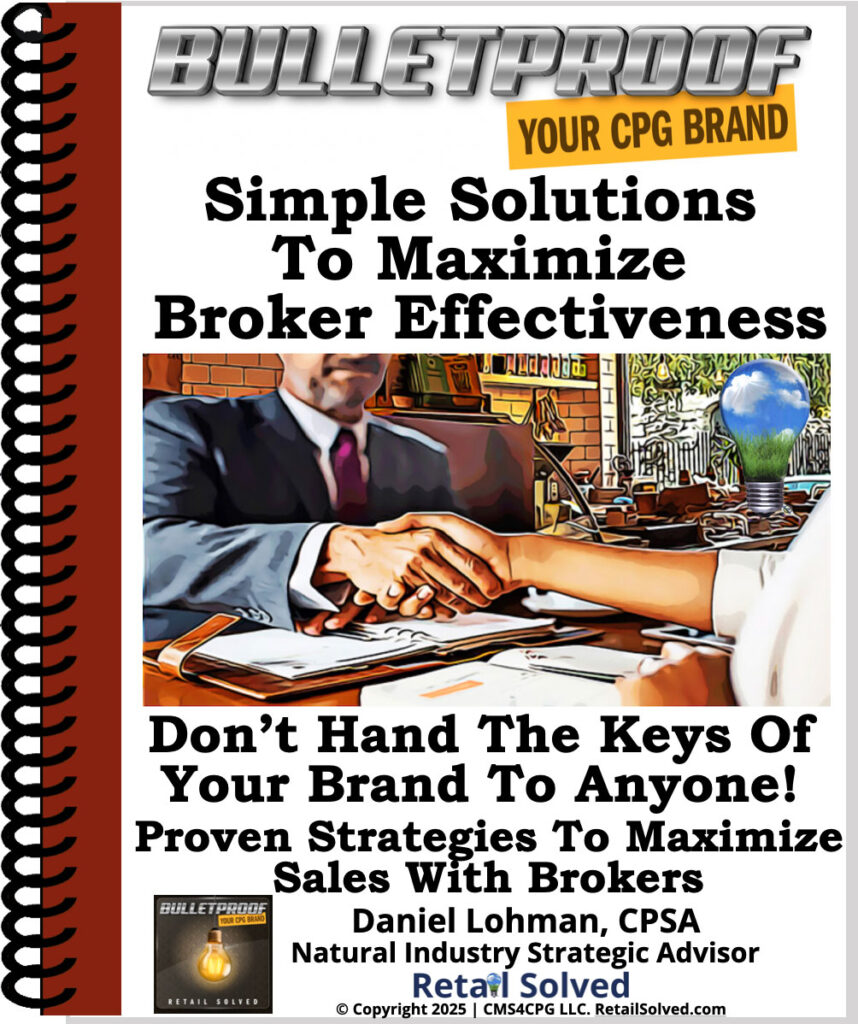
Want Simple Solutions To Maximize Broker Effectiveness?
Want consistent sales growth? Brokers are an extension of your sales team. Help them succeed through accountability to maximize sales, increase distribution & accelerate growth. Brands typically have a love hate relationship with their brokers. Learn crucial strategies to improve their results while holding them accountable. This is how you instantly gain a significant competitive advantage.
Image is the property of CMS4CPG LLC, distribution or reproduction is expressively prohibited.
